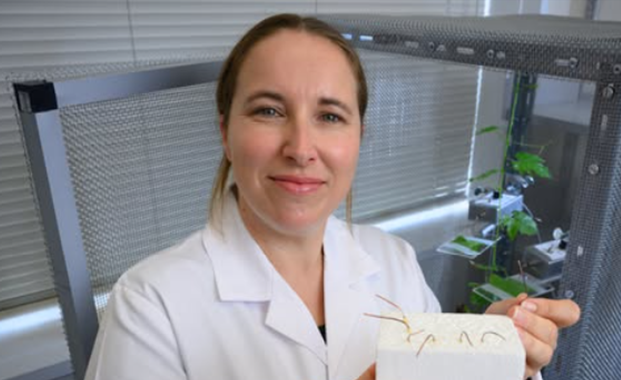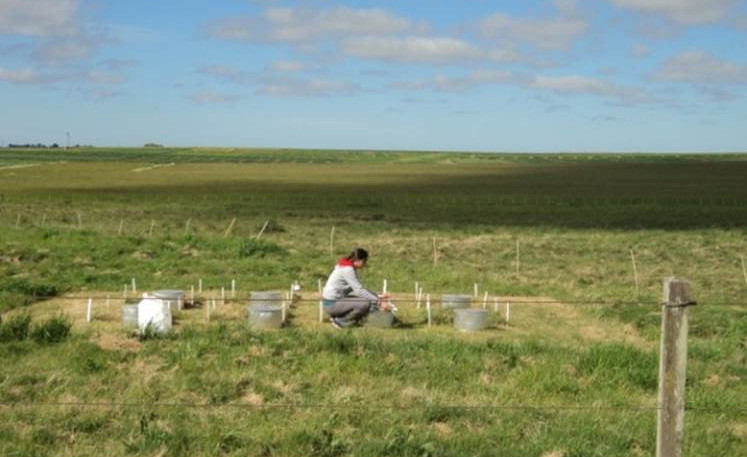New Sustainability Fund to support green initiatives
22 February 2024 | News
Lincoln University has announced the first round of funding from its new Sustainability Fund, sourced from a surcharge that applies to all air travel undertaken by University staff.
The first round of funding, totalling almost $40,000, will contribute to a range of projects aiming to support more sustainable research and teaching at the University and/or reduce carbon emissions on campus.
A grant of $15,000 has been awarded to Dr Bin Tian, senior lecturer and researcher in wine science and microbiology, for his project WineCycle, which will transform the waste product of the winemaking process into valuable garden fertiliser.
With more than 40 students enrolled in Lincoln’s Viticulture and Oenology programmes annually, the University typically generates ~.5 tonnes of byproduct, known as grape marc, from winemaking. Staff and students involved in the WineCycle project will construct a composting facility for the grape marc, later distributing the compost as fertiliser around the vineyards and other horticulture activities on campus. The WineCycle project will also develop online lecture materials to support the teaching of sustainable winemaking, and will showcase the composting initiative to visiting wine industry professionals.
$10,000 from the Sustainability Fund has been granted to a 10-person cohort of Lincoln University soil scientists to take a low-carbon path to attend the New Zealand Society of Soil Science and Soil Science Australia Joint Conference (NZSSS), to be held in Rotorua in December 2024. This year’s NZSSS will bring together 200 leading and emerging soil scientists from Australia and Aotearoa to advance understanding of topics ranging from carbon sequestration to sustainable agriculture.
The Lincoln delegation, comprising a mix of academic staff and students, will travel by train from Christchurch to Picton, then on to Wellington by passenger ferry, with one night’s accommodation in the Wellington Central YHA. The group will then travel by bus to Rotorua to attend the conference before undertaking the same journey in reverse to return to campus, sharing their experiences with the community along the way via social media and other channels. This low-carbon path will reduce greenhouse gas emissions by a full 82% than if the same journey was undertaken by air travel.
A further $8,000 from the Sustainability Fund has been granted to a group of four Lincoln University staff to create a resource guide to assist academics in embedding sustainability into all of the University’s courses and programmes.
The project will review a teaching toolkit developed by University College London – Embedding Sustainability in your Teaching and Learning – which outlines strategies to embed Educational Sustainable Development (ESD) into the curricula of tertiary institutions. ESD aims to equip students with the knowledge, skills and attributes needed to work and live in a way that safeguards environmental, social and economic wellbeing for present and future generations.
The new resources developed by the group will support Lincoln staff from all faculties and disciplines to incorporate ESD into Lincoln’s courses and programmes.
$3,200 has been granted to a group of Lincoln staff and students from three campus organisations – Lincoln University Students’ Association (LUSA), Lincoln Environmental Sustainability Society (LESS) and Sustainability Action Group for the Environment (SAGE). The group manages and promotes Sustainability Week, a campus-wide annual event featuring a wide range of sustainability-themed activities that encourage the University community to think more proactively about their environmental impacts and to behave more sustainably in their everyday lives.
The funding for Sustainability Week 2024 will be used to host related activities, including an event to promote more sustainable transport options for the daily commute, a planting event where 400 native seedlings will be planted in Lincoln University’s Arboretum, and a panel discussion focusing on the University’s progress towards its emission reduction targets and achieving its sustainability goals.
$3,555 from the Sustainability Fund will be used to purchase the Peek app – a user-friendly online tool that provides an accessible and inclusive student-centred learning environment for field trips and other excursions. Peek will support sustainability education at Lincoln through delivering interactive information to participating students about the ecological, social and cultural features of their excursion locations in and around campus and in the wider Canterbury region.
Lincoln University Vice-Chancellor, Professor Grant Edwards, is also Chair of the University’s Sustainability Taskforce. He says sustainability is at the heart of the University’s teaching, research and leadership.
“Lincoln is Aotearoa’s only specialist land-based university, and we are deeply committed to ensuring future generations can flourish and grow. We are firm in our intent to be an exemplar of sustainable practices for the land-based sector, and the ecosystems within.
“Our Sustainability Fund delivers another opportunity for our staff and student whānau to thrive and grow, and further strengthens our kaupapa to contribute to a more sustainable world.”
Sustainability Fund
Lincoln University’s Sustainability Fund was introduced in late 2023 to support the development of campus or community-based sustainability activities.
The Fund was established to receive, accrue and allocate proceeds from a 5% sustainability surcharge, also introduced in 2023, that applies to all work-related air travel undertaken by Lincoln University staff.
The purpose of the Sustainability Fund is to enable more sustainable research and teaching practice and to support campus initiatives to reduce greenhouse gas emissions.
Lincoln staff and/or students can apply for grants in groups or individually to a maximum of $20,000 per grant.


